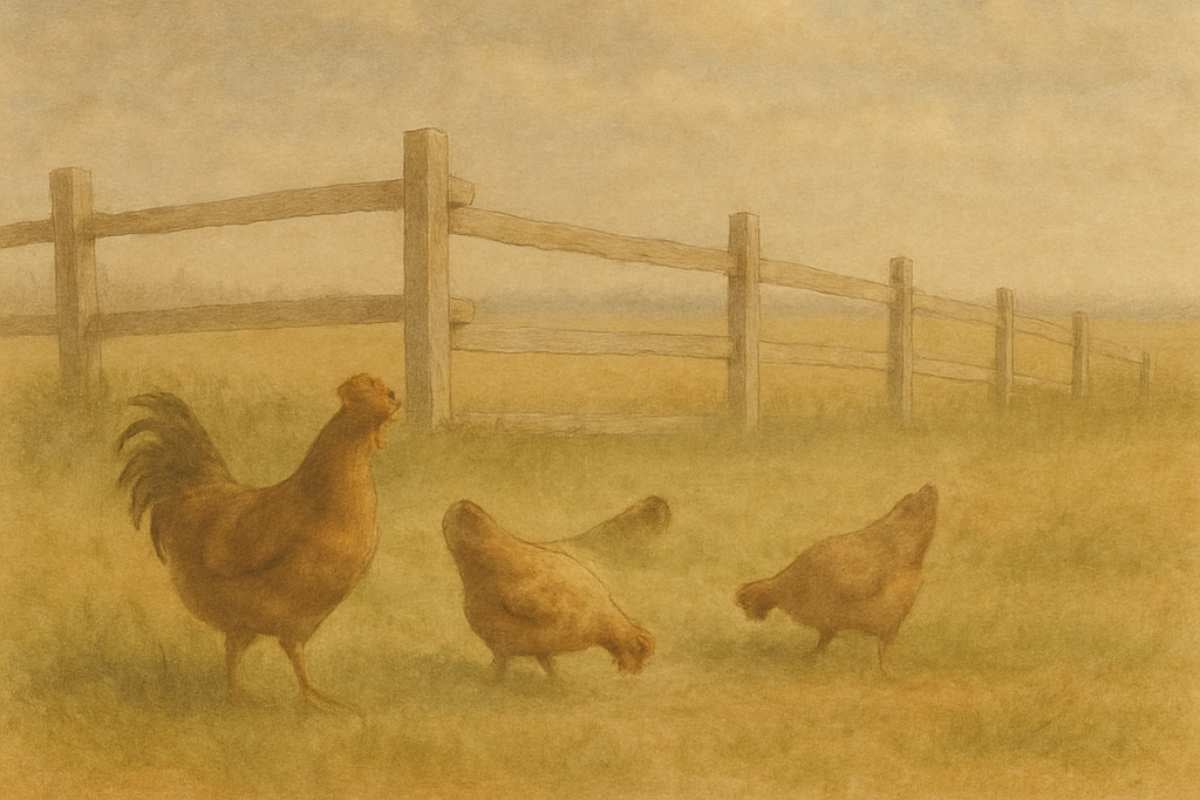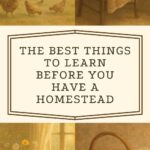Inside: The best skills to master for homesteaders, wherever you live right now. Reading is fun, but practicing is a million times better. Roll up your sleeves and work on these now.
It’s so easy to wish away your whole life, waiting for your dream property, dream job, dream whatever. And when you’re living in the city or suburbs, wishing you were homesteading, it can feel like your whole life is on pause.
But it isn’t! There is so much you can do and learn right now, wherever you are. And these skills will serve you so well in the future, but more importantly, right now.

These are sort of in order, but sort of not. You’ll never “master cooking” and then move on to preserving. You’ll always be learning everything, all at once.
1. Learn To Cook (But Really)
This is your foundation! Everything else builds on this. Honestly even if you never go beyond this step, you’ll more self-sufficient than many people. And if you never master this, all the goat raising and carrot growing in the world won’t get you all that far.
So I encourage you to start simple: learn how to make a meal from whole ingredients. Soups, stews, roasts, sauces. You don’t need to make your own bread at first, you just need to make your own dinner.

Then, get comfortable using leftovers. Can you make them into something else? Can you look at what’s in your fridge and turn it into a new meal?
Next, get comfortable cooking with what’s in season and what does well in your area. Can you adapt your favorite sweets to use honey? Can you put together a meal out of what’s in season in May?
You get the idea. It’s not about a list of skills that require more time and money. At least not yet. It’s about working with what you have, even when it doesn’t seem fun and that box of Lucky Charms sounds pretty good.
You will get beyond this. But it’s still where you have to start.
2. Learn to Preserve Food
Once you know how to cook, the next step is making that food last.
When your fridge is full of leftovers, or your neighbor drops off a basket of extra tomatoes, or you find a huge sale at the market — you’ll want to know what to do with it all.
Preserving keeps you from wasting food and makes your hard work stretch farther.
Start with freezing. Learn how to blanch vegetables, freeze berries the right way, and keep leftovers from getting freezer-burned and sad.
Next, move into water bath canning. Jams, pickles, tomato sauce — anything high-acid is a good place to start.
When you’re ready, pressure canning will open up even more: soups, beans, meats, and full meals, all shelf-stable and ready to go.
Dehydrating is another simple way to make food last. Dried fruit, jerky, even herbs for your spice cabinet — it’s all easy once you know how.
You don’t need a giant garden to practice these skills! You can start with whatever you have right now: a few extra carrots, a box of strawberries, a leftover roast.
Preserving teaches you to think ahead, waste less, and work with nature instead of fighting it.
3. Learn to Grow Something
After you know how to cook and preserve food, the next step is pretty simple: could you grow some of it yourself?
Start with a pot of herbs. Stick a tomato plant in a bucket. Scatter some lettuce seeds in a container and see what happens. (It’ll probably bolt before you’re ready. It’s fine. It’s part of it.)
The goal isn’t to be self-sufficient today. The goal is to notice — how a seed sprouts, how quickly a little green thing can shrivel up when you forget to water it, how good it feels to snip your own basil instead of buying a sad grocery store bunch for $3.99.

You’re going to kill some plants. You’re going to overwater, underwater, and accidentally fry a few poor seedlings in a sunny window. Congratulations: you’re officially a gardener.
Every season you try, you get a little less helpless. A little more tuned in. A little more ready for the life you’re dreaming about. And in the meantime? You’ll have fresh mint for your tea, basil for your pizza, and a tomato you’ll want to take a picture of before you eat it. (And you absolutely should.)
One more time for the people in the back: you will make mistakes and that is the point!
4. Learn to Make and Mend Things
Making soap? Sure.
Cleaning supplies? Why not.
A pillowcase that looks like it survived a minor tornado? Absolutely.
Maybe you start with a melt-and-pour soap kit. Maybe you mix up a batch of vinegar cleaner and feel weirdly proud every time you wipe the counters. Maybe you sew a crooked hem and realize no one but you will ever notice.

The point isn’t to be perfect. It’s to remember that most of the stuff we buy? Someone else just made it up first. You can, too.
Every little thing you learn to make or fix builds the kind of scrappy, capable mindset you’ll need when you finally get to your land. And in the meantime? You’ll save a little money, waste a little less, and walk around feeling just a little more unstoppable.
5. Get Comfortable with Animals (Even If You Don’t Have Any Yet)
This one can feel tricky when you’re still in a neighborhood or an apartment.
If you have the option to keep a few hens, go for it. And maybe bees, if your town and your nerves can handle it.

But even without livestock of your own, you can still practice:
- Get used to cooking with real cuts of meat. A whole chicken, a brisket, a pork roast. Learn how to break things down, roast bones for broth, render a little fat for cooking. It’s very different from throwing a shrink-wrapped chicken breast in a frying pan. If you’re used to 100% boneless skinless white meat, there’s a learning curve.
- Volunteer. Help out at a local farm, a community garden, or even a rescue. Learn how animals act, how much space they need, what they eat, what they wreck. (Spoiler: It’s a lot.)
- Study for later. Read up on breeds. Watch how people set up fencing. Pay attention to the little things you won’t learn from a pretty Instagram post, like how fast pigs root up a pasture or how often you need to check a fence line.
The point here is just to stop thinking of animals as neat little cartoons that live in your future dream.
They’re real. They’re messy. They will stomp on your nice shoes and eat your favorite plants and make you cry and make you wake up early.
And when the time comes to bring animals into your life, you’ll be ready.
6. Master Time Management (Before It Masters You)
This lifestyle can be a grind. So this is the season to start building good habits.
Get used to working off a list, even when you don’t feel like it.
Practice doing the unglamorous stuff first, like the dishes before the sewing project, the fence repair before the jam-making afternoon. Learn how to sort real priorities from “someday” projects, so you don’t end up with fifteen half-finished ideas and a pile of tools left out in the rain.

And maybe most important, start noticing how you feel when you’re busy : the good kind of tired after a productive day, and the bad kind after a day spent spinning your wheels. You’ll need that awareness later, when the work piles up and the weather’s against you, and quitting looks a lot more tempting than finishing the job.
Homesteading doesn’t get easier: you get tougher, smarter, and more efficient. So start building that muscle now, while the stakes are still small.
Because if you can’t manage a busy day in town, you’re not going to magically thrive when your responsibilities are even bigger.
7. Build a Network (Even if You’re Not a “Joiner”)
Homesteading might sound like a rugged, lone-wolf life — just you, your goats, your garden, and peace and quiet forever.
But…you’re going to need people.
You’ll need the neighbor with the better tractor, the friend who has a backup incubator when yours dies, the woman at the farmers’ market who knows exactly how to treat goat bloat at two in the morning. But if you wait until you need them to start building those relationships, it’s already too late.

So buy from local farmers when you can, even if it’s just a dozen eggs or a jar of honey, say hi at the seed swap,
volunteer at the 4-H tent at the county fair, even if you have no idea what you’re doing.
You just need to show up, help out when you can, and build real connections by asking real questions and listening more than you talk.
Self-sufficiency sounds great, but a good neighbor is worth more than a root cellar full of canned tomatoes.
Don’t wait to find your people. Start now, while the stakes are low and the world is still spinning easy.
You Will Get There
I know you’re reading this because right now you feel like you want something that you can’t have. But this season of waiting is a gift even if you don’t see it now. You’re not stuck. You’re getting ready.







